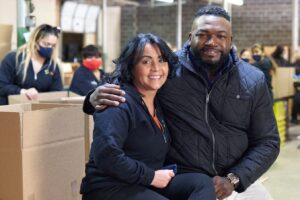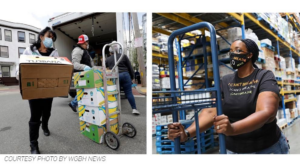Elizabeth Souffrane and her 7-year old son are homeless.
Their housing struggle began long before the pandemic, when Elizabeth – a domestic violence survivor – escaped from her abuser with her young son. For nine months, they couch surfed, but with COVID-19 and so many families facing financial, housing, and health crises all at once – they ran out of places to stay. Before seeking assistance from La Colaborativa, Elizabeth and her son were sleeping in a car parked outside of the Chelsea police station each night.
Elizabeth has struggled immensely to recover from the financial, physical, and mental effects of domestic abuse. Her abuser made it impossible for her to hold a steady job. He worked to keep her depending on him and believing she had no other options. She is lost in a public services system that has been overwhelmed during the pandemic – most offices are closed to the public and her calls and voicemails to local housing authorities and the Department of Transitional Assistance have gone unanswered.
Elizabeth came to La Colaborativa desperate for help. Our staff spent a full day working to secure a shelter placement for the family, with no luck. We will never turn away a family in need or let members of our community sleep on the streets, so we’ve secured a hotel room for Elizabeth and her son until Monday. When she heard the news, Elizabeth fell to her knees – overcome with gratitude and relief.
We must do better to provide permanent, stable, and safe housing options to people like Elizabeth. The housing crisis in Chelsea and across the region has been building for years. In the COVID era, the eviction moratorium only protects those who already have homes. Just this week, La Colaborativa has placed seven families in emergency housing. We have a list of 1,400+ additional local families reporting risk factors that will likely lead to their displacement by the end of the year. Now is the time for significant investment in housing relief and infrastructure to prepare for the wave of evictions that is inevitable in October, when the moratorium is expected to be lifted.
La Colaborativa is working with city and state officials, private donors, landlords and housing authorities, and community members to develop sustainable solutions to keep our families housed. We’ve distributed nearly $500,000 in cash assistance to Chelsea families since the start of the pandemic, through the One Chelsea Fund and through a generous contribution from the Eos Foundation and the Family Independence Initiative providing 100 families with $1,000 each.
We need your help
- Thank you for showing up for immigrants during this crisis. Here is how you can help us drive sustainable change that will improve housing conditions for more families over the long-term. We are asking our supporters to call Governor Baker and state legislators, share information on social media and throughout your networks, and donate to support families like Elizabeth’s.We must expand the capacity of emergency shelters across the Commonwealth
- We must invest significant resources – public and private – in rental assistance and rental forgiveness programs
- We must expand access to free legal representation for tenants facing eviction through the Right to Counsel program
- We must increase resources to help families navigate transitional assistance programs (e.g. RAFT) when facing homelessness
- Community-based hubs like La Colaborativa, which have Spanish-speaking staff, need more resources to sustain and expand our lifesaving services for families.




